Must-try Foods in Kanazawa and Restaurant Recommendations for First-time Visitors
Located in Ishikawa Prefecture, Kanazawa lies along the Sea of Japan and is part of the Hokuriku region. The city is well-known for its preserved Edo historical districts, beautiful gardens, and rich traditional crafts. Kanazawa culinary scene reflects its cultural heritage and geographical location. In this travel guide, we’ll feature some must-try foods when visiting Kanazawa and the restaurants where we had great meals.
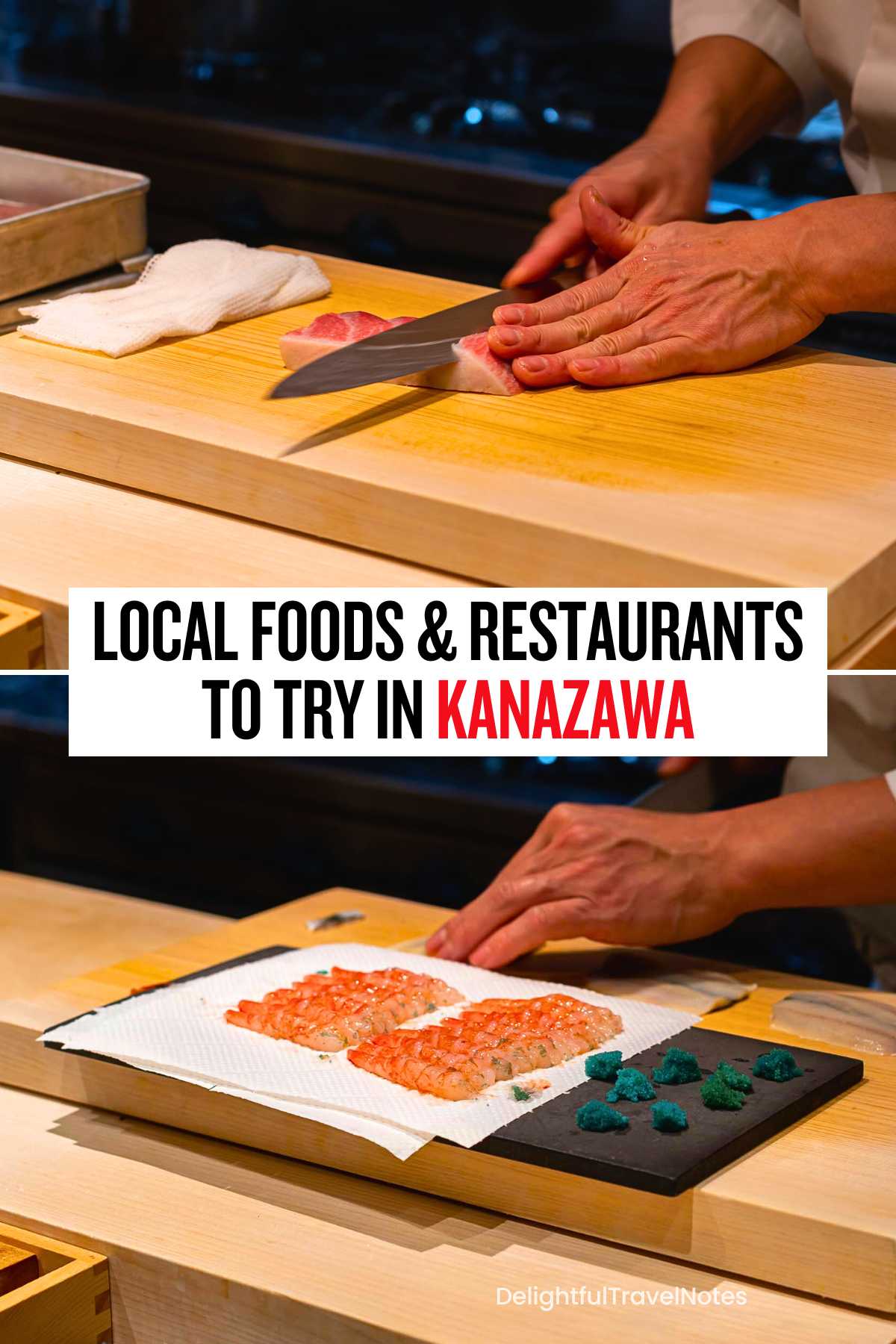
Top Foods to Try in Kanazawa
Kanazawa is accessible by the Hokuriku Shinkansen (bullet train) from major cities like Tokyo, making it a convenient destination for travelers looking to explore beyond the popular golden route. The city offers amazing food at very reasonable prices compared to similar restaurants in Tokyo, Kyoto, and Osaka.
Fresh Seafood
Kanazawa is famous for its abundant fresh seafood, particularly with delicacies like kaisen-don (seafood bowl), nodoguro (blackthroat seaperch) and snow crab. Nodoguro is prized for its rich, succulent, fatty flesh – always the first recommendation when someone heard that we were going to visit Kanazawa.
You definitely should consider a visit to Omicho Market where the freshest seafood (including nodoguro) and local produce are displayed. The market features vendors selling everything from live crabs to freshly caught fish, as well as small eateries and food stalls offering kaisen-don and sashimi. I’m normally not a fan of this kind of market, but unlike Tsukiji in Tokyo, which is very touristy and crowded, Omicho Market still retains a local feel. The atmosphere was lively but not too busy for us to comfortably wander around.
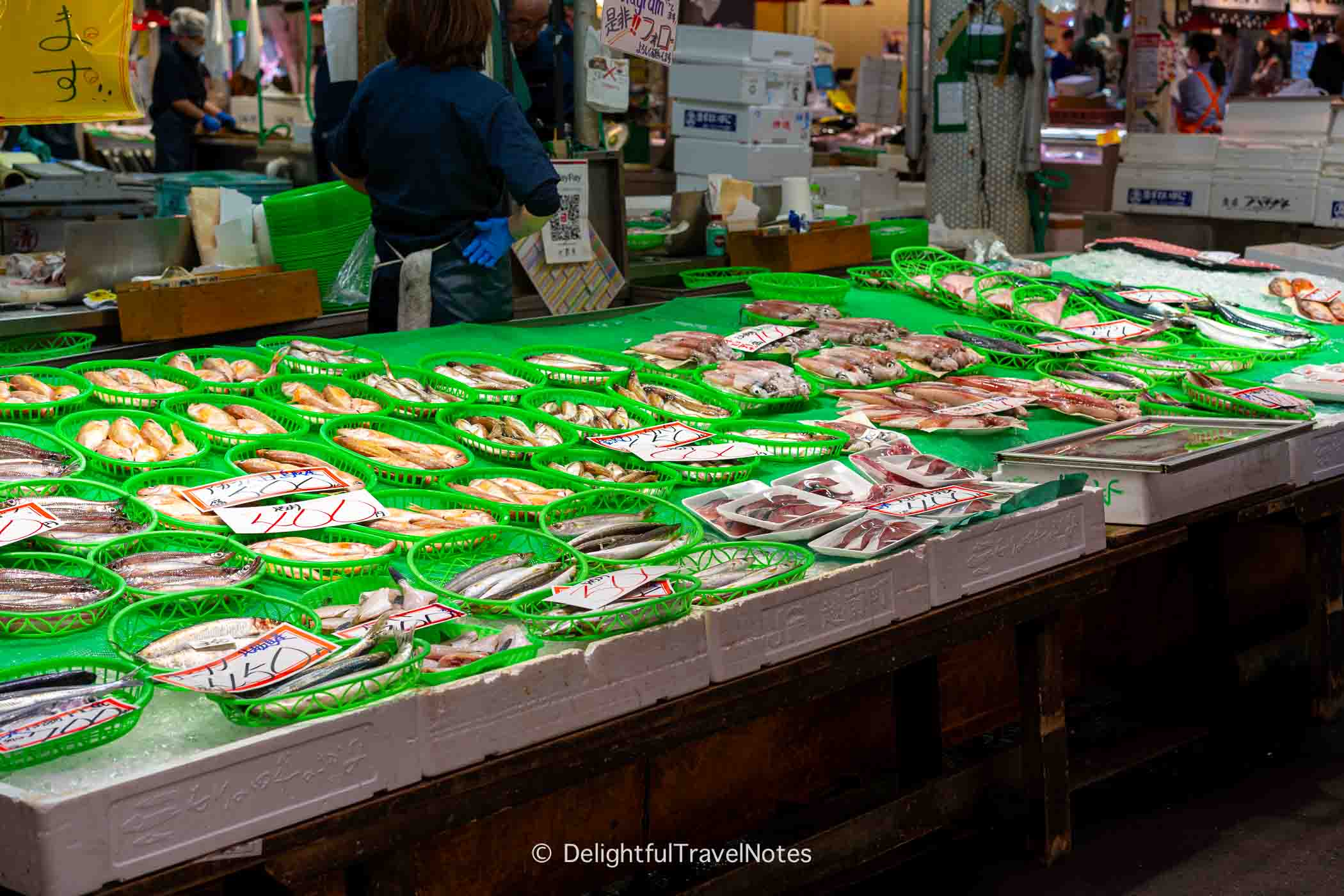
There’s also no shortage of upscale and high-end sushi omakase in Kanazawa. We had a lovely dinner at Sushi Issei and paid 13,000 yen per person. The price was very reasonable, but at the same time, at that price, we knew we shouldn’t expect top-tier quality. For example, the ratio of fish to rice could be slightly higher. However, we still highly recommend it for the fish quality, the skill of the chef, the friendly atmosphere and its good value. Some dishes were amazing, and you can read our detailed review here. Reservation is required.
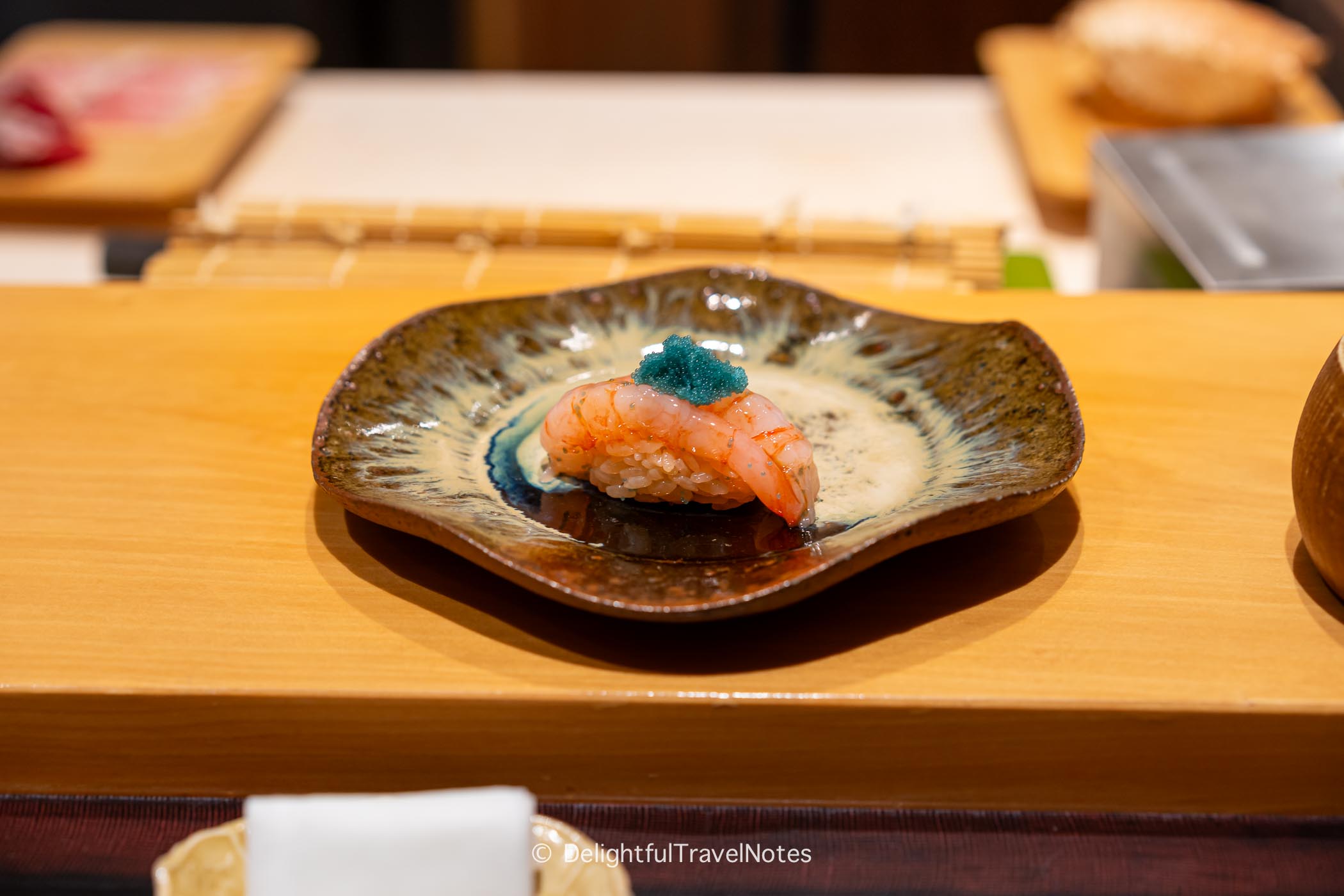
At a lower price range of 5,000 – 6,000 yen per person, we tried Sushi Rekireki. It was quite decent, but the skill was lower than at higher-tier establishments such as Sushi Issei, and more importantly, the counter service felt quite robotic.
Kanazawa Curry
Kanazawa curry is known for being darker, thicker and sweeter compared to other Japanese curries. We stopped by Champion’s Curry inside Omicho Market for a quick lunch on a rainy day. The price was very cheap for a plate of curry with a crispy breaded cutlet. It’s possible to choose the serving size and add other toppings, such as breaded shrimp. To order, you need to use the vending machine in front of the restaurant.
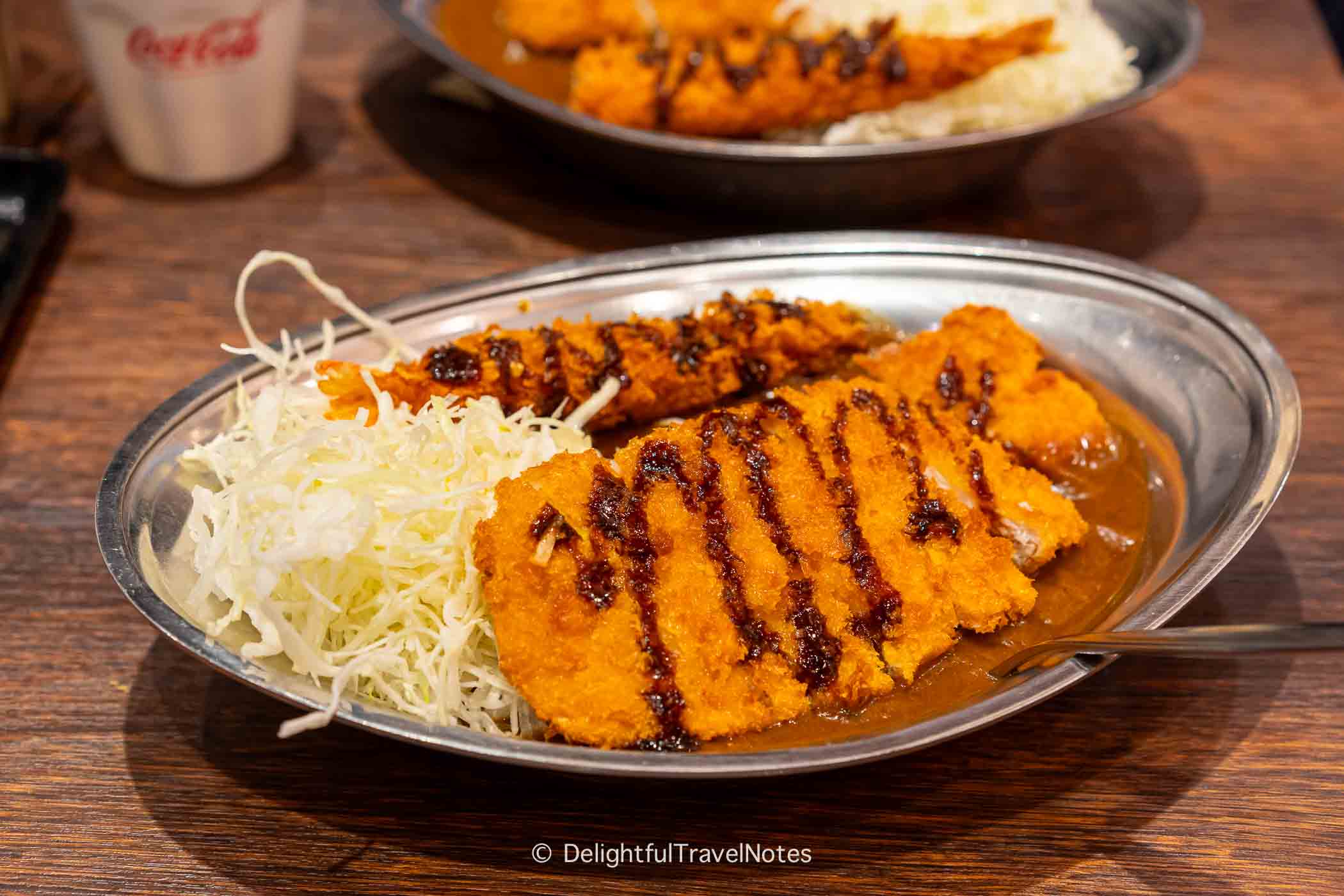
During a morning buffet at our hotel, The Hotel Sanraku Kanazawa, they also served Kanazawa curry. Their version was extremely dark – almost black – while the curry at Champion’s was dark brown. Despite the color difference, the taste was quite similar, and neither version was spicy.
Oden and Jibuni
Oden is a popular Japanese dish that consists of various ingredients such as daikon, fish cakes, tofu simmered in a soy-flavored dashi broth. Kanazawa’s version often incorporates regional specialties. Jibuni is a traditional Kanazawa dish featuring simmered duck meat, wheat gluten, mushrooms, and seasonal vegetables in a thick soy-based broth.
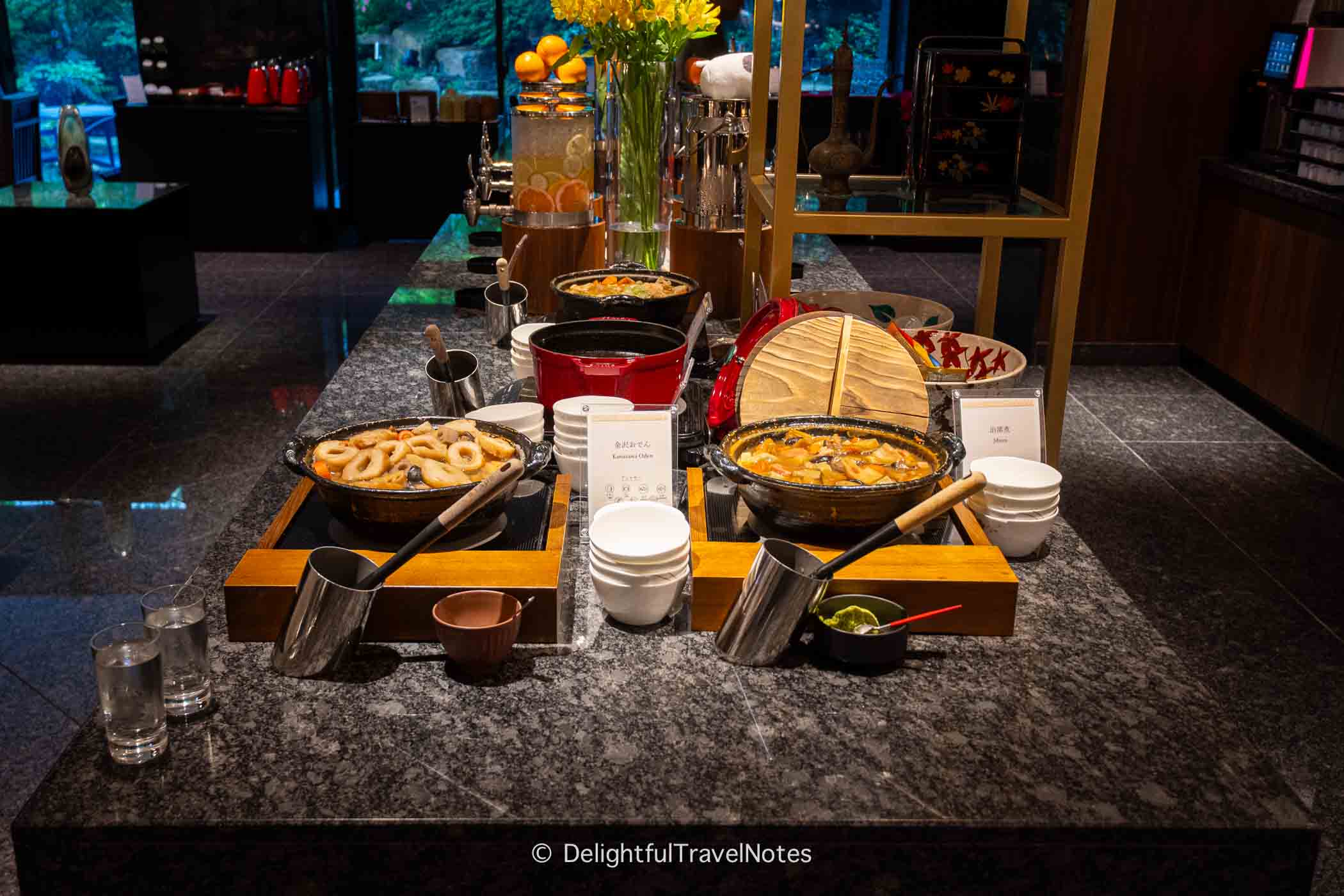
We were fortunate that our hotel did an excellent job of introducing local specialties in their breakfast buffet spread, allowing us to sample both dishes. While they aren’t my favorite Japanese dishes, the taste was interesting and worth trying in a small bowl.
One of the best places to experience Kanazawa oden is in the city’s many traditional oden bars and izakaya. Omicho Market also has several stalls serving Kanazawa oden and they seemed pretty popular when we visited the market.
Kaga Ryori
Kaga Ryori, the traditional cuisine of Kanazawa, includes a variety of dishes featuring local ingredients and seasonal produce, often served in a multi-course meal (kaiseki). Having experienced kaiseki quite a few times in other cities in Japan, we opted for a more focused experience this time – a soba course meal at Kyoumi Kai.
This small restaurant is located at the corner of Higashiyama District in a well preserved charming house. There are just 3 tables so reservation is definitely recommended. The food reminded me of Kyoto cuisine as the flavors were light, letting the natural taste of the ingredients do the talking. We got to try soba in a couple new ways: soba dumplings and cucumber soba sushi rolls.
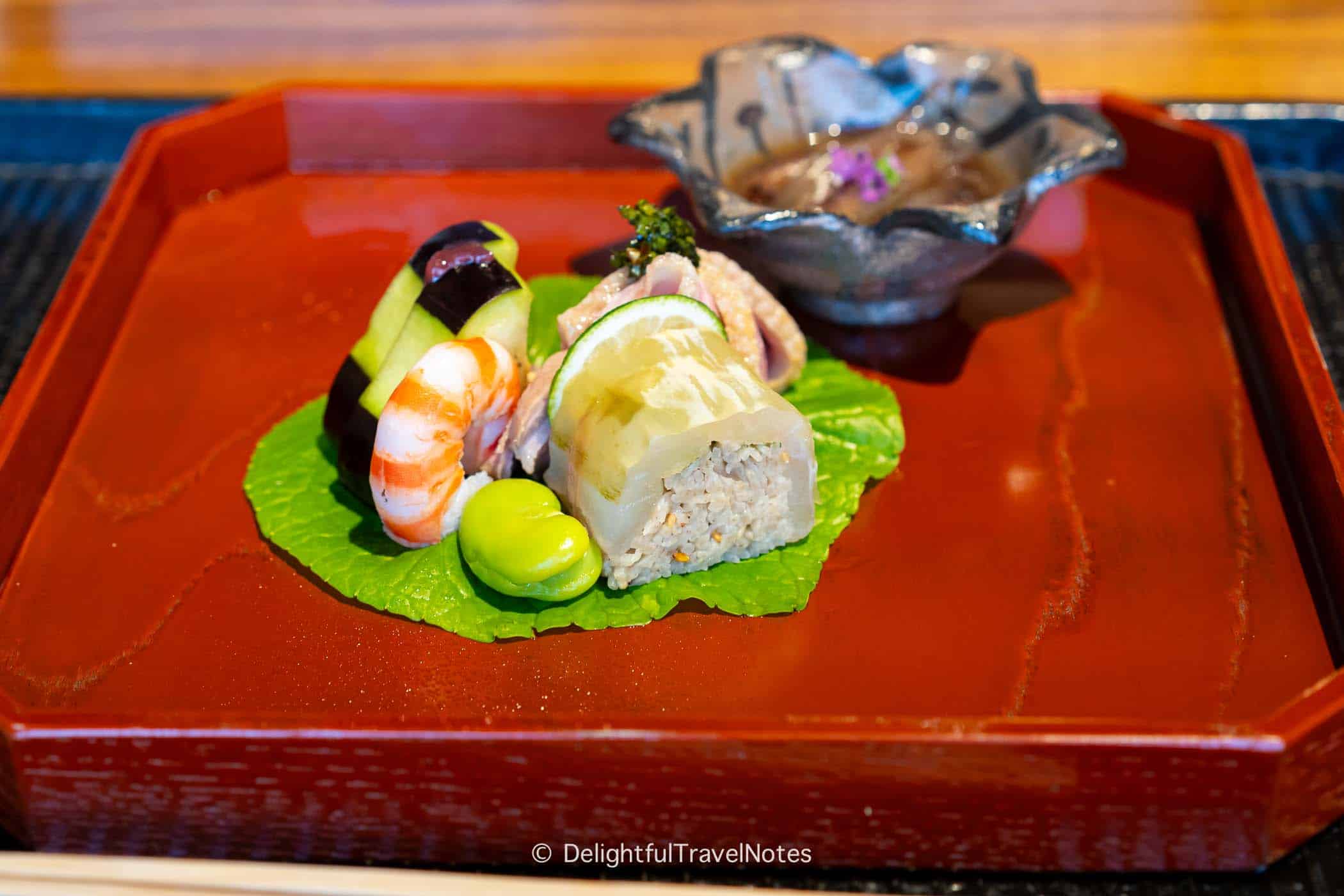
The main course was simply cold soba, which was incredibly tasty. The noodles were nutty and chewy in a satisfying way. I could eat a large bowl with not much accompaniment as the noodles were already delicious on its own. If you’ve never tried fresh soba, it’s in a completely different league compared to dried soba.
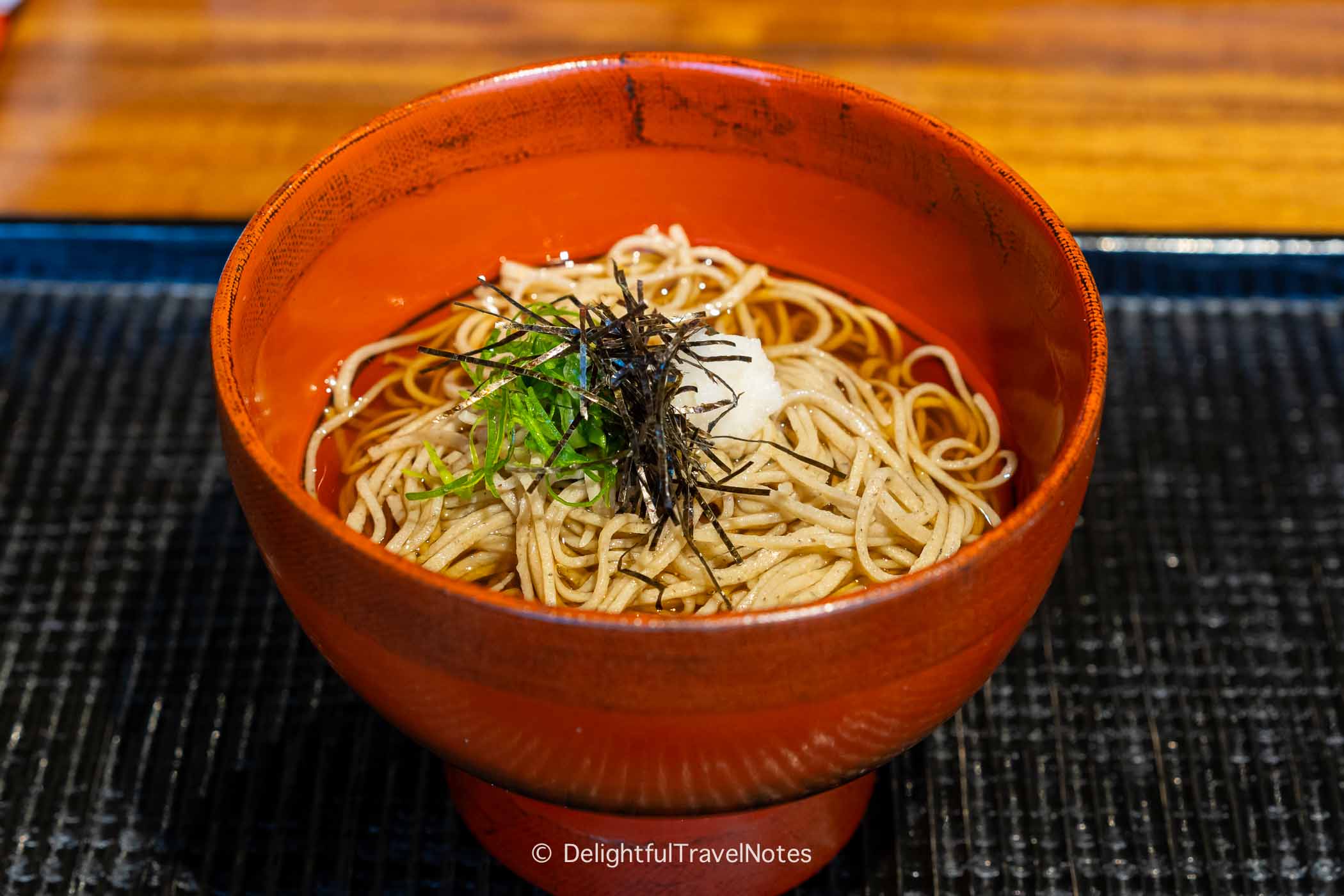
Boucha Roasted Tea Porridge
Boucha roasted tea porridge is a delightful congee cooked in brewed Kaga boucha, a roasted tea from the Kanazawa region. Nutty, creamy, and incredibly comforting, we enjoyed this dish with Japanese umeboshi (pickled plums), grilled salted fish, and pickles at our morning buffet every day.
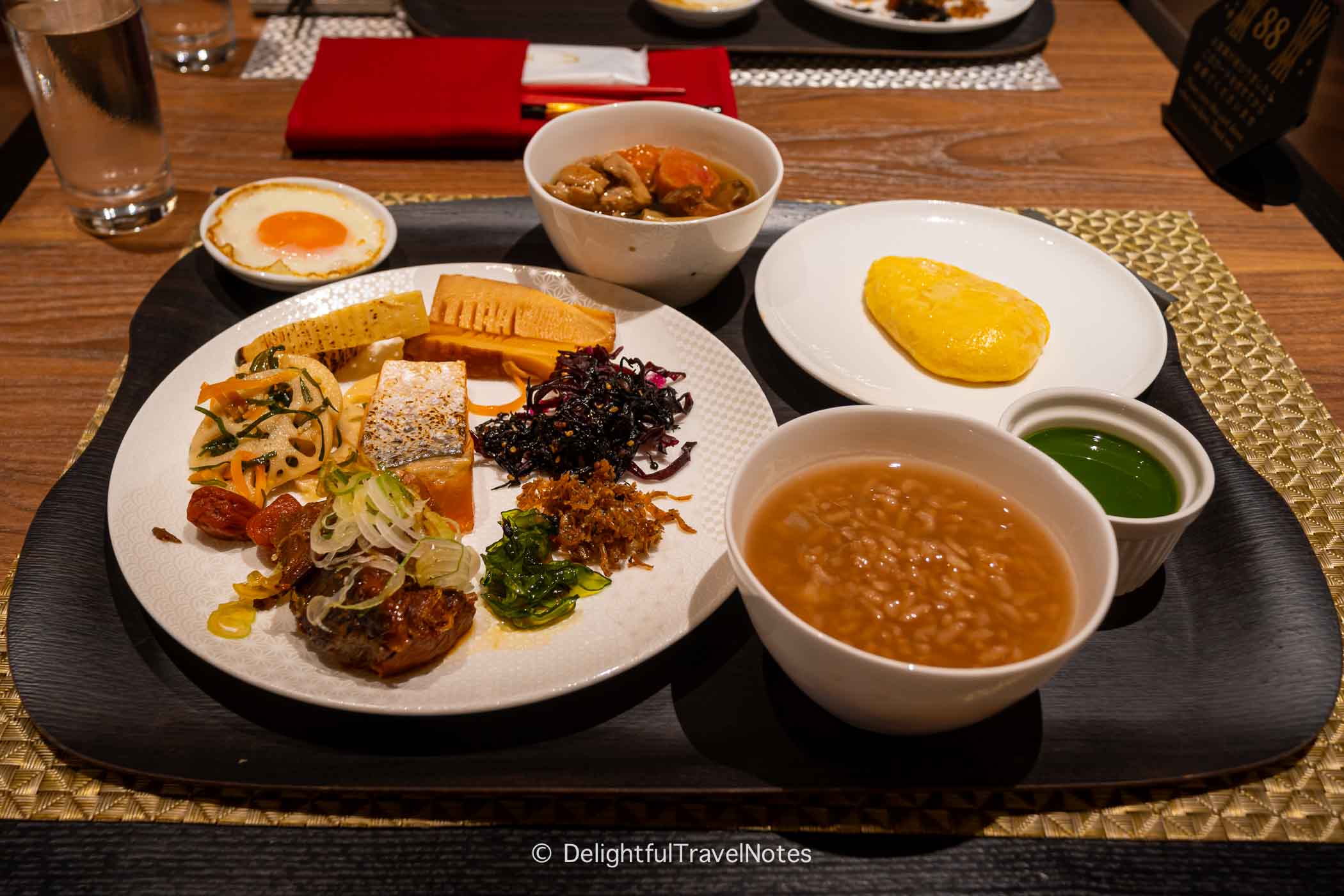
This dish reminded us of the traditional roasted tea porridge of Nara, which we tried at Shisui Nara. We liked it so much that we had to recreate it at home, adding it to our regular breakfast rotation.
Unfortunately, I’m not sure where else you can try boucha roasted tea porridge in Kanazawa, as we only had it at the morning buffet in Hotel Sanraku Kanazawa. If you’re staying at a hotel that offers a local Japanese breakfast, be sure to look for this regional specialty.
Sweets
Soft-serve ice cream topped with a sheet of edible gold leaf is very popular with tourists in Kanazawa. This creative dessert reflects the city’s famous gold leaf production. While you’ll see it all over the city, it’s not something I would highly recommend as a must-try, since you mainly pay for the appearance, and the gold leaf itself has no flavor.
Kanazawa is also known for its wagashi, traditional Japanese confections. A great place to browse these sweets is at Hyakubangai, the large shopping mall at Kanazawa Station.
My personal recommendation for having desserts in Kanazawa is Waguri Shiratsuyu, a small local sweet shop in Higashiyama District specialized in chestnut desserts, especially the Mont Blanc. This shop has only several tables but we came at 2:30 after our lunch at Kyoumi Kai and didn’t have to wait. Each customer needs to order one dish.
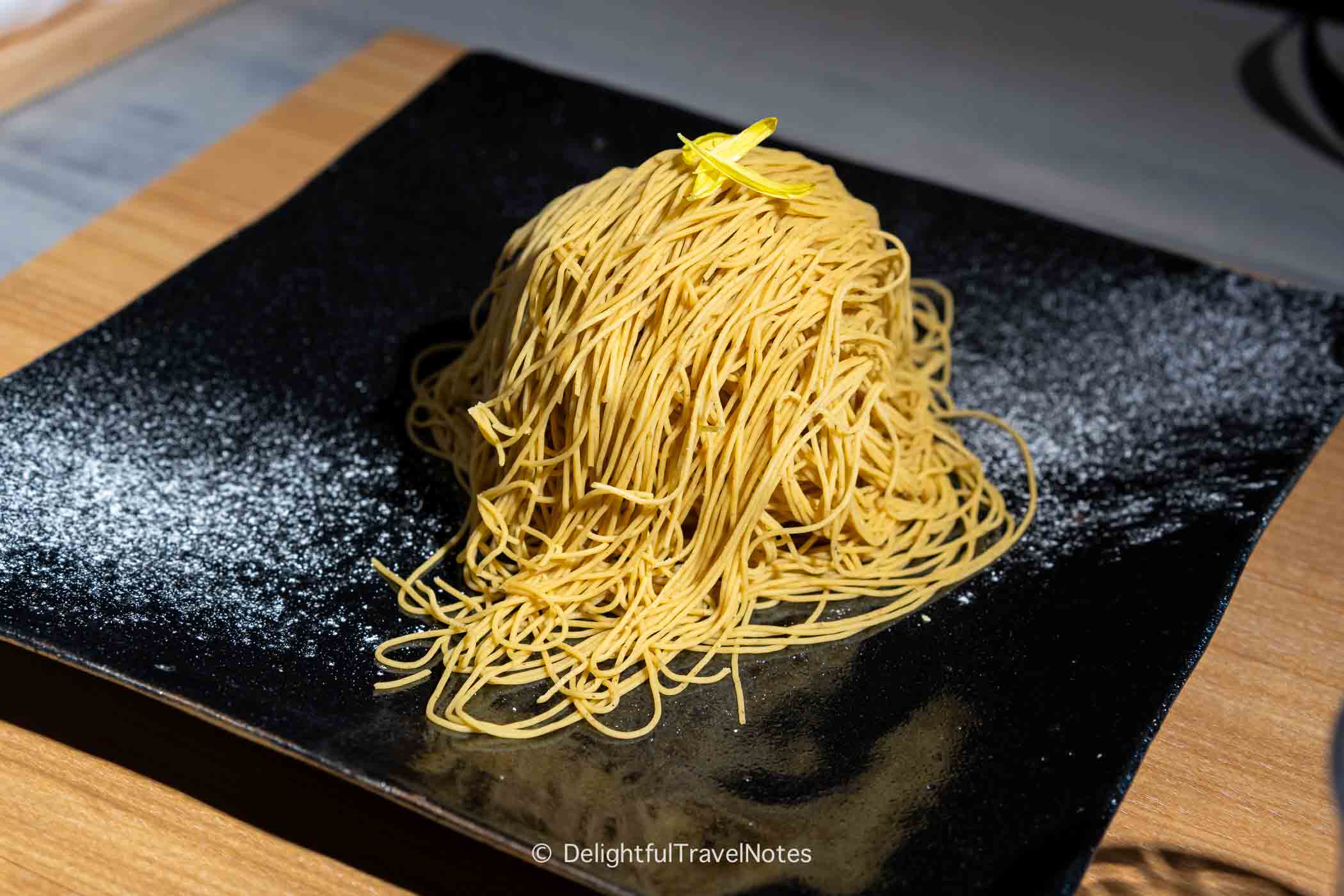
Mont Blanc is well loved in Japan and the dessert itself is inspired by the mountain’s appearance, with its distinctive look created by thin strands of chestnut puree piled high, resembling snow-covered peaks. Waguri Shiratsuyu has both Mont Blanc made with fresh chestnuts and roasted chestnuts. We ordered both and were pleasantly surprised to prefer the one made from fresh chestnuts, as the flavor was stronger and sweeter. The staff plates the desserts right at your table, which adds a nice touch to the overall experience.
Additional Recommendations & Final Thoughts
I bookmarked quite a few restaurants that looked interesting in Kanazawa but didn’t have time to visit them all. Here are some other restaurants that I saved for future trips:
- French cuisine: Jardin Paul Bocuse, Installation Table ENSO
- Izakaya: Fuwari, CRAFEAT, Taishu Kappo Uogin
- Curry: Turban Curry
Overall, Kanazawa will not disappoint food lovers with its wide range of local foods and restaurants. While restaurant staff may be less familiar with English compared to those in Tokyo, Kyoto, and Osaka, they are generally very friendly. All of our dining experiences were relaxed and enjoyable.
Finally, I recommend The Hotel Sanraku Kanazawa for its extensive breakfast spread featuring local specialties as well as its excellent location (right opposite Omicho Market, walking distance to Kenrokuen). Their breakfast buffet was among the best we’ve had in Japan so far. Check out my detailed review of Hotel Sanraku Kanazawa here.
The Hotel Sanraku Kanazawa
Booking.com Agoda.com

Explore More
Bamboo Groves to Visit in Kyoto (and Alternatives to Arashiyama Bamboo Forest)
The Thousand Kyoto Review: Wonderful Hotel Right Next To Kyoto Station
How To Plan An Amazing Trip to Kyoto (Beyond General Japan Travel Tips)